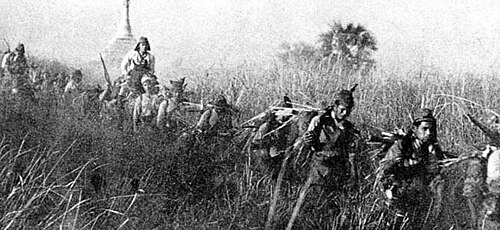[Ed. Note: This article is part of a collection of essays entitled “Critical Reflections on the 80th Anniversary of the End of World War II” published in August 2025.]
Translated into English by Steve Rabson, with editorial assistance from Joseph Essertier
Since 2005 I have been conducting, through a veterans association, oral history interviews with former soldiers of the Japanese Imperial Army and their families. They served in the Second Division (Dai-Ni Shidan) and fought in the Burma campaign. Oral histories provide candid accounts unobtainable from written records. Veterans associations are volunteer organizations made up of both combat veterans who share battlefield experiences in the military and the experience of belonging to their unit, and also of the bereaved families of deceased soldiers. The Veterans Research Group (Sen’yūkai Kenkyūkai) at Kyoto University conducted extensive surveys of association members in 1978, 1980, and 2005, but because the types of surveys varied widely, it has been difficult to determine things like the number of veterans associations represented and the number of respondents, or to evaluate the results. Membership in veterans associations peaked between 1965 and 1969 when many were founded, and they continued to be active from the 1970s and into the 1990s; but with the aging of former soldiers in the 2000s, an increasing number have shut down.
I was a participant in an association that was drawing to a close.1 Its main functions were conducting memorial services and setting up monuments, as well as publicly honoring the war dead and cultivating friendships in order to comfort bereaved families and friends. My role was not as a researcher, but as a service volunteer. Devoting myself to delivering meals and handling other chores, I strove to gain the veterans’ trust. For collecting oral histories, the listener’s attitude and the venue are crucial. I did not just listen to what I wanted to hear but listened quietly and supportively, allowing the former soldier (the speaker) to set the pace. It is extremely difficult for soldiers to talk about a battle that they survived but that took the lives of virtually everyone else. With the heavy sense of responsibility they feel, it took years before they were able to begin talking about their combat experiences. Not limiting our conversations to the war, I listened to them as they told me about their lives. I would see elderly soldiers’ expressions soften when they spoke about their mothers. When their former commanding officer participated in the conversation, we would have to move somewhere else in order for me to hear their criticisms of that former officer.
When a subject is speaking from a faulty memory or telling a lie, their credibility is put into question from the perspective of the researcher conducting oral histories, but it is still crucial to listen attentively. One can consult others’ testimonies or written records to determine veracity, but if someone tells a lie, one must consider why he lied and the social circumstances, in order to deeply understand his combat experience. For example, a veteran of the Second Division’s retreat at the Battle of Imphal (8 March – 3 July 1944) described a comrade who ended his life himself with his gun barrel in his mouth, but the veteran told his mother, “Your son died heroically in battle.” He cried during our interview, explaining, “I just couldn’t tell that poor mother the truth.” Facts don’t always represent the truth. Former soldiers are reluctant to talk about the “realities” of war.
Veterans’ associations might seem like gatherings of conservative, nostalgic old men, but this is a superficial view. They include a variety of opinions. Even if former soldiers are reluctant to discuss the killing they did, it is wrong to assume that they lack a capacity for reflection. Even those who espouse conservative views sometimes advocate against war. They returned to their home country bearing many emotional scars. At one hot spring resort gathering, a former soldier sobbed as he confessed to other veterans that he had participated in the massacring of civilians on the China front. Overhearing him from the other side of a [paper] fusuma sliding door, I was painfully aware that he could not possibly speak about such a reality of war to me, someone born after the war.
During Prime Minister Abe Shinzō’s second administration, many young, conservative right-wingers joined veterans associations praising the war “not as one of aggression, but of Asian liberation,” thinking this would please the former soldiers. Instead, some veterans strongly rebuked them, and, as the mood at the associations grew increasingly gloomy, many members left. Such thoughtless words and actions are all-too prevalent in Japan today. Can postwar Japanese possibly understand the complicated feelings of soldiers who were victims forced to become perpetrators? I have become aware that ignoring these veterans’ meticulous oral histories represents a major failure of Japanese society today.
旧日本軍の戦友会のオーラル・ヒストリーの実践
遠藤美幸
2005年より、ビルマ戦に従軍した旧日本軍第二師団の戦友会で、元日本兵とその家族のオーラル・ヒストリーを行っている。文献史料からは到達できない元兵士らの「本音」を知ることができるのはオーラル・ヒストリーの成果である。
戦友会とは、軍隊において戦場体験や部隊への所属体験を共有した元軍人や遺族による任意団体である。京都大学のグループ(戦友会研究会)が大規模なアンケート調査(1978年、1980年、2005年)を実施したが、実に多様な形態があり、数や参加人数などの総括的な把握が難しい。1965年から69年が戦友会の結成の最盛期であり、1970年から90年代は活発に活動していたが、2000年代に入ると元兵士の高齢化で閉会する会が急増した。私は終焉に至る戦友会に参加した2。戦友会の主な役割は、戦没者の慰霊・顕彰や会員や遺族の親睦(癒し)がある。私は研究者ではなく「世話係」という立ち位置で、食事の手配など雑用に徹しながら信頼を得ることに務めた。オーラル・ヒストリーでは、どこで誰がどのように聴くかが重要である。聴きたいことを聴くのではなく、元兵士(語り手)の呼吸と歩調に合わせて黙して耳を傾けた。全滅戦の生還者の将兵の口は重く、生き残ったことに深い自責の念を抱いており、戦場体験を語り始めるまでに数年を要した。戦場体験だけでなくライフストーリーを聴いた。母親の思い出を語る老兵の顔は柔和になった。上官が戦友会に参加していると、上官の批判ができないので場所を変えて話を聴いた。オーラル・ヒストリーでは語り手の記憶違いや嘘をどのように捉えるか、信憑性が論点になるが、まずは嘘も「沈黙」も聴くことが肝要だ。別の証言や文献史料とクロスし、嘘かどうかを検証し、それが嘘であっても、その人がなぜ嘘を語ったのか、その社会的な意味を考察することが戦場体験をより深く理解することに繋がる。例えば、ある元兵士はインパール作戦の敗走戦で銃口を口に銜えて自決した戦友の母親に、「息子さんは立派に戦闘で戦死した」と語った。彼は「哀れな母親に本当のことは話せない」と泣いた。事実が必ずしも真実を表わさすとは限らない。元兵士が話したくないことに戦争の「本質」がある。
一見、保守的で懐古主義的な老人の集まりと見なされる戦友会だが、それは一面の理解である。戦友会には多様な見解が混在している。元兵士らが加害を積極的に語らないからと反省がないと見なすのは軽率である。保守的な言論の元兵士でも「不戦」を訴える。彼らは多かれ少なかれ心に傷を抱えて祖国の土を踏んだ。温泉場の戦友会で、ある兵士は人目を避けて中国戦線での住民殺戮を戦友に告発し嗚咽した。襖を挟んで、戦後生まれの私には話せない戦争のリアルを突きつけられた。
第二次安倍政権の頃、戦友会に保守系右派の若者が次々に参加し、先の戦争は「侵略ではなくアジアの解放戦争だ」と賛美した。こういえば元兵士が喜ぶと信じていた。彼らを叱責する元兵士もいたが、次第に戦友会の変容に憂いて元兵士の姿を消えた。このような言動の浅慮が今の日本の社会全体にもあるのではないか。戦後の社会は、加害者にさせられた被害者でもある元兵士の複雑な思いに「聴く耳」をもっていたのか。元兵士らに対する丹念なオーラル・ヒストリーが十分にできなかった日本社会の欠落点に気づかされる。
Notes:



